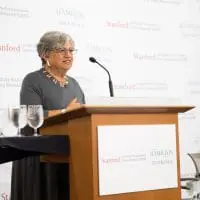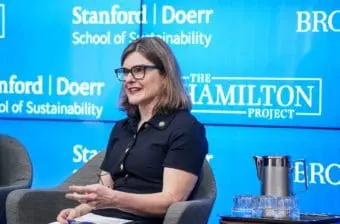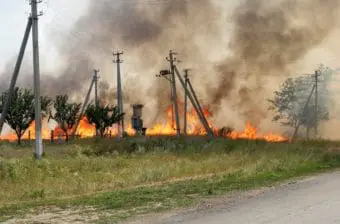
The existing patchwork of climate policies is insufficient and often inefficient in its effort to achieve emissions reductions and broader climate objectives. While there is some reason for optimism in the technological developments that make decarbonization possible, current public policies do far too little to support these developments and offer appropriate incentives for reducing emissions.
On October 23, The Hamilton Project at the Brookings Institution and Stanford Institute for Economic Policy Research (SIEPR) co-convened a forum to explore economic policy innovations to combat climate change. The event featured keynote remarks by Mary D. Nichols, chair, California Air Resources Board, and opening remarks from Robert E. Rubin, former U.S. Treasury Secretary, and Kathryn Moler, vice provost and dean of research and professor of applied physics, Stanford University.
The event also included three roundtable discussions that concentrated on policy options to address climate change in the absence of a federal carbon price, how policy can encourage technological advances to mitigate the impact of climate change, and environmental policy and regulatory possibilities once a carbon price is achieved.
Roundtable panelists included Nancy Sutley, chief sustainability and economic development officer, Los Angeles Department of Water and Power; Christy Goldfuss, senior vice president, energy and environmental policy, Center for American Progress; Abigail Dillen, president, Earthjustice; Jerry Taylor, president, Niskanen Center; Nathaniel Keohane, senior vice president, climate, Environmental Defense Fund; Etosha Cave, co-founder and chief scientific officer, Opus 12; Chris Field, Perry L. McCarty director, Stanford Woods Institute for the Environment and Melvin and Joan Lane professor for interdisciplinary environmental studies, Stanford University; Lawrence Goulder, Shuzo Nishihara professor of environmental and resource economics, Stanford University; Lucas Davis, Jeffrey A. Jacobs distinguished professor in business and technology, Haas School of Business, University of California, Berkeley; and Lauren Sommer, science and environment reporter, KQED Public Radio, among other distinguished experts and scholars.
The event coincided with the release of a set of economic facts from The Hamilton Project and SIEPR and three new Hamilton Project proposals that focused on promoting low-carbon technologies, making clean performance standards efficient and effective, and how the regulatory landscape might shift in the presence of a carbon price.
Agenda
12:00 PM Registration Opens
12:30 PM Welcome and Introductory Remarks
Kathryn Moler
Vice Provost, Dean of Research and Professor of Applied Physics, Stanford University
Robert E. Rubin
Former U.S. Treasury Secretary
Co-Chair Emeritus, Council on Foreign Relations
12:40 PM Keynote Remarks
Mary D. Nichols
Chair, California Air Resources Board
1:10 PM Roundtable Discussion: Policy options to address climate change in the absence of a federal carbon price
Carolyn Fischer
Senior Fellow, Resources for the Future
Lawrence Goulder
Senior Fellow, Steering Committee Member, Stanford Institute for Economic Policy Research (SIEPR); Shuzo Nishihara Professor of Environmental and Resource Economics, Stanford University
Nathaniel Keohane
Senior Vice President, Climate Environmental Defense Fund
Nancy Sutley
Chief Sustainability Officer, Los Angeles Department of Water and Power
Moderator: Charles Kolstad
Senior Fellow, Stanford Institute for Economic Policy Research (SIEPR); Professor, by courtesy, of Economics, Stanford University
2:00 PM Break
2:10 PM Roundtable Discussion: How can policy encourage technological advances that can help mitigate the impact of climate change?
Etosha Cave
Co-Founder and Chief Scientific Officer, Opus 12
Chris Field
Perry L. McCarty Director, Stanford Woods Institute for the Environment; Melvin and Joan Lane Professor for Interdisciplinary Environmental Studies, Stanford University
Lucas Davis
Jeffrey A. Jacobs Distinguished Professor in Business and Technology, Haas School of Business, University of California, Berkeley
Ryan Nunn
Policy Director, The Hamilton Project, Fellow, Economic Studies, The Brookings Institution
Moderator: Lauren Sommer
Science and Environment Reporter, KQED Public Radio
3:05 PM Roundtable Discussion: Which policy and regulatory changes would be possible after a carbon price is achieved?
Abigail Dillen
President, Earthjustice
Christy Goldfuss
Senior Vice President, Energy and Environmental Policy, Center for American Progress
Jerry Taylor
President, Niskanen Center
Roberton C. Williams III
Professor, Department of Agriculture and Natural Resources, University of Maryland
Moderator: Jay Shambaugh
Director, The Hamilton Project, Senior Fellow, Economic Studies, The Brookings Institution




